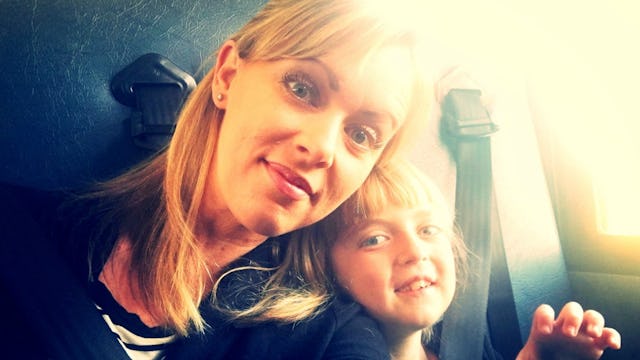My Daughter With Autism Is My Greatest Teacher

My daughter Emerson loves to tell me about her dreams. Upon listening to them, I realize that they are more “stories” that she creates in her head to connect things that have happened throughout the day or the week, things she wants to hold on to as significant, or perhaps file away to understand a bit better.
She tells me these 10-plus-minute-long “dreams” as I am brushing her hair in the morning or driving her to school, my mind drifting as she chirps on excitedly. I don’t dare interrupt these times because she is sharing a piece of herself with me, and I know how lucky I am to receive it.
We received her official diagnosis the other day: autism spectrum disorder. I sat crying in the waiting room because I knew that it was the last time I would ever be anywhere where I didn’t know “for sure.” The last moments I had under the enveloping cloud of uncertainty that had become so familiar over the last several years.
Sure, it was always apparent that something was “off” as she grew and developed (or at times, didn’t). As a small child, new situations terrified her; the uncertainty of a new experience rushed at her like a tidal wave, enveloping all that she knew was safe and predictable. The only way she knew how to cope with the overwhelming sensory onslaught that followed was to throw an epic fit.
My poor older daughter learned to deal with the disappointment of either me or my husband having to sneak out the backdoor at recitals and preschool graduation ceremonies to calm our panicking toddler. We also noticed that her motor skills were underdeveloped, and she experienced extreme aversions toward certain textures, whether they belonged to a princess costume that was too rough to the touch or a snack that her mouth found to be highly offensive.
No parents see these behaviors and telltale signs in their toddler and immediately jump to the autism conclusion. It’s a process which unfolds excruciatingly over time. Excuses and other possible explanations for the behaviors are created, and sometimes clung to like a life raft. In those times, it seemed crucial to have support from those surrounding our family.
Instead, we were mostly met with trepidation radiating from family members not knowing how to interact with her; judgment, razor-sharp and cutting deep with words such as “Are you positive she just doesn’t need a different parenting approach?” and “Just send her to my house for a week. I’ll ‘fix’ her right up.” We were rejected by family we had asked to babysit her — she was too “unpredictable.” We were rejected by entire groups of friends who were “turned off” by our actions in trying to alleviate her anxiety and overstimulation.
So many have been quick and even eager to judge, but not to understand. Not that I understand much of what her inner life is like — at times, she draws into herself like a flower shrinking away from the darkness. Other times, her emotions swell and burst from her, sometimes as anguished confusion, but sometimes as joyous excitement. How I wish others would have looked beyond their indignation to see the wonder and brilliance that is this child. And how thankful am I that I was blessed with her pure heart, which does not know how to hate, or resent, or hold contempt…or judge.
I consider Emmy to be one of my greatest teachers, and I hope others will see the joy, quirkiness, and mystery wrapped up in that delicate little package. I hope people will learn more and more to understand instead of judge, offer help instead of give “advice,” and try to embrace the person in their lives who is perhaps a bit different, but who perhaps holds a multitude of wonder within her “dreams.” I know I can’t wait to hear about tonight’s while we brush our hair in the morning.